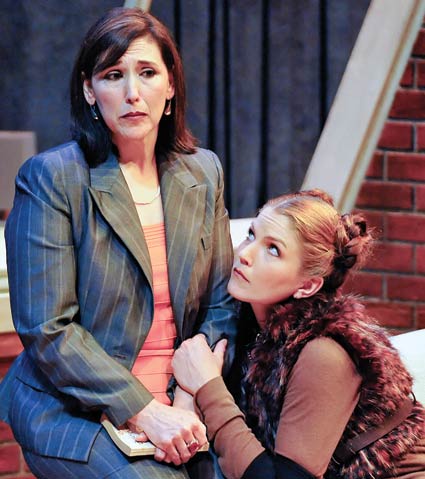Sylvia at PCPA’s Solvang Festival Theater
Play Runs Through July 25

When a love affair intrudes on 25 years of marriage, it’s easy to blame the intruder. In Sylvia, playwright A.R. Gurney explodes that assumption. The play centers on a classic love triangle between Greg (Peter S. Hadres); his wife, Kate (Catalina Maynard); and Greg’s new love interest, Sylvia (Stephanie Philo)—except that Sylvia is a dog. Greg and Kate are empty-nesters who’ve recently moved from the suburbs to New York City, where Kate’s teaching Shakespeare to Harlem teenagers. She’s less than impressed when she comes home one day to find her husband canoodling on the floor with Sylvia. “I have a need,” Greg says, a little pathetically. Kate is unmoved: “What need?” “I’m not sure,” Greg counters, “but I have it.”
Unlike his wife, who alternates between burying her nose in school papers and hassling Greg about his job, Sylvia’s always frisky, always attentive. She follows him around the room, nibbling on his fingers and gazing at him adoringly. “Even when you hit me, I love you,” she declares. “I think you’re God.”
When the play premiered in 1995, Sarah Jessica Parker played the title role, and under Patricia M. Troxel’s direction, Philo gives it bouncy blond bubble and froth. It isn’t all light, though. The fact remains that there’s a younger “woman” in the house, and though Sylvia might bark at stray cats, Kate’s got animal instinct, too. “I want to put Decon in her dog dish,” she admits to her bourgeois bohemian Vassar friend, Phyllis (flamboyantly played by Richard Gallegos).
It’s at the park, where Greg found Sylvia in the first place, that he gets some sage advice from a leash-toting wise fool of the Brooklyn variety—Phyllis again. “You give a dog a woman’s name; you start to think of her as a woman,” this pooch owner warns. It’s a little late: Sylvia’s in heat, and Greg is jealous of Bowser the boxer.
What’s missing in this production is a sense of deep and unshakable commitment between Greg and Kate. Their love is something we assume because of fact, not evidence. Ultimately, Sylvia isn’t about a dog at all; it’s about a marriage in its readjustment years, when we ask ourselves what we really want out of life, and whether we’re getting it yet.



